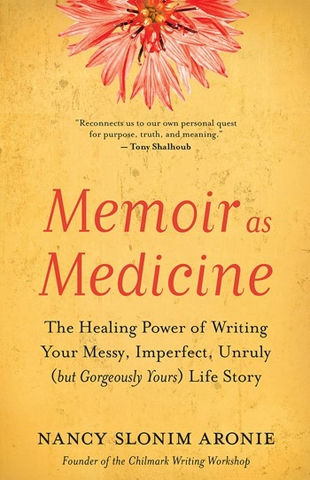For at least a generation, the writing of memoir has been taught as a therapeutic tool, and this has benefitted thousands of people. We think of great authors such as Anne Lamott (see her book, Bird by Bird) and Julia Cameron (see our review of The Artist’s Way) who have written memoir for this purpose and taught lots of others how to do so too.
We think also of another great memoirist, Patricia Hampl (Virgin Time; etc.), who in an essay called “Memory and Imagination” put it very plainly: “Our capacity to move forward as developing beings rests on a healthy relationship with the past.” This is absolutely true.
Author Nancy Slonim Aronie stands in this great tradition, both as a writer and teacher of those who would like to write their way to healing. Her very first sentence is this: “No shrinks, no pharmaceuticals, no comforting friendships, no exceptional partner (like the one I have) could come close to what writing my memoir did for my broken heart.” She has taught her memoir workshop at places like Kripalu, Omega, Esalen, and Harvard University.
In this new book, Aronie addresses what we all face, if and when we face a keyboard to come to grips with our past: uncertainty (ch. 3), procrastination (ch. 5), being honest (chs. 6, 9, 21, 36, and more), spirituality (ch. 8), forgetting about optics (ch. 15), how to use a journal most effectively (ch. 22), and the sometimes playful, such as “Be an Eavesdropper” (ch. 34). The nitty-gritty is here, too, such as how to use dialogue (ch. 35), when and when not to quote other people (ch. 51), how to handle situations where you don’t trust your memory (ch. 52), and the importance of reading your writing out loud (ch. 56) in order to get it right.
Helpful writing prompts appear at the end of each chapter, such as “What do you do instead of writing? Write about it.” And, “Write about a time you felt one way and acted another.”
We all have stories to tell, and telling them can bring us healing. This is the message of Memoir as Medicine. Whether or not your memoir is ever professionally published — Aronie tells us that hers still has not — doesn’t much matter. She includes many excerpts from her own memoir, a work of many decades, to illustrate her points. It’s the telling, and being heard by someone else, that matters most.
